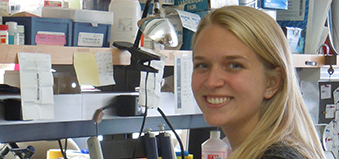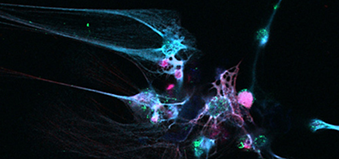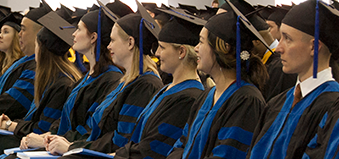Immunology
The Immunology PhD program specifically designed to provide strong training in basic molecular and cellular immunology, the immunology of chronic diseases, as well as in-depth knowledge of the pathogenesis, diagnosis, prevention and treatment of inflammatory diseases including infections. We integrate clinical studies and patient contact throughout the training period.
The Immunology program participates fully in the MS in Biomedical Research.
Faculty & Research
The training faculty of the interdepartmental Immunology Program is drawn from the Departments of Immunology, Molecular Biology and Microbiology, Medicine, Ophthalmology, Medical Education, and Developmental, Chemical & Molecular Biology at Tufts University School of Medicine, the Jean Mayer USDA Human Nutrition Research Institute on Aging and the Cummings School of Veterinary Medicine.
Our faculty provide a supportive environment that helps each student realize his or her fullest potential.
Admissions
Students seeking admission to the Immunology Graduate Program apply to the Graduate School of Biomedical Sciences. Most applicants have had significant research experience and completed courses in biology and related sciences in college
The Immunology program is committed to diversity and encourages applications from individuals with diverse backgrounds and experiences that will enrich the mix of students on our campus. These include individuals determined by NIH as being under-represented in biomedical sciences, including individuals with disabilities. GSBS offers a full range of services to support its students.


Immunology Curriculum
Our curriculum is grounded in the knowledge that immunology and inflammation is at the heart of many diseases including asthma, rheumatoid arthritis, cardiovascular disease, obesity, diabetes, osteoporosis, inflammatory bowel disease, Alzheimer’s disease, cancer, stroke and many neurological disorders.
Course work and clinical experiences begin in July of the first year with a special course that introduces students to issues related to immunology and inflammatory diseases. Additional coursework, seminars and workshops provide a strong foundation for thesis research.
Beginning in September of the first year, students conduct four laboratory rotations to explore thesis labs and learn techniques. Following the rotations, students select their dissertation lab and begin working on their PhD project.
Immunology Retreat
The Immunology program sponsors an annual retreat each year that brings together students, postdoctoral fellows and program faculty.

Meet Our Students
Our students come from across the US and the world and are pursuing a wide range of thesis projects.
Student Publications
Publication of research is a key part of training and our students publish their work in excellent journals.
Program Outcomes
Over 90% of our students complete an advanced degree and go on to pursue a wide range of careers.
Immunology Contact Information
Pilar Alcaide, PhD
Program Director
Stephen Bunnell, PhD
Admissions Director
Li Zeng, PhD
Associate Admissions Director
Curtis Barber
Program Coordinator


